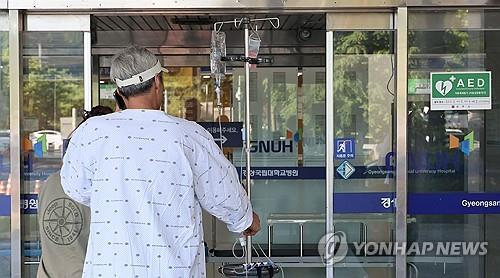- California Assembly OKs highest minimum wage in nation
- S. Korea unveils first graphic cigarette warnings
- US joins with South Korea, Japan in bid to deter North Korea
- LPGA golfer Chun In-gee finally back in action
- S. Korea won’t be top seed in final World Cup qualification round
- US men’s soccer misses 2nd straight Olympics
- US back on track in qualifying with 4-0 win over Guatemala
- High-intensity workout injuries spawn cottage industry
- CDC expands range of Zika mosquitoes into parts of Northeast
- Who knew? ‘The Walking Dead’ is helping families connect
Despite court ruling, standoff over med school quota hike to continue amid doctors’ opposition
A recent court ruling against striking doctors will likely accelerate the government’s push to markedly raise medical school admissions, but doctors have vowed not to back down to continue a standoff despite deepening chaos in the health care system.
On Thursday, the Seoul High Court rejected a request from trainee doctors, medical professors and other opponents to block the government’s plan to increase the number of medical school students by 2,000 starting next year from the current cap of 3,058.
The decision paves the way for the government to finalize the first medical school quota hike for South Korea in 27 years, aimed at addressing chronic shortages of doctors.
“The government will swiftly push for the revision of school regulations for the quota expansion and other requirements for college admissions for the 2025 academic year,” Prime Minister Han Duck-soo said in a televised briefing Thursday following the court’s decision.
The government decided to allow medical schools to exercise flexibility, and about 1,500 seats are expected to be added at medical schools nationwide combined next year, which is to be finalized by end-May.
Doctors, however, said they will not change their course and prepare to appeal the ruling to the Supreme Court.
Medical professors plan to hold a general meeting next week to discuss their next steps, including the adjustment of hospital operation schedules, as the current walkout by their junior colleagues is widely expected to prolong.
A majority of trainee doctors have remained off the job since Feb. 20 in protest of the government’s quota hike plan, and medical professors, who serve as senior doctors at major hospitals and have filled the void of trainee doctors, have taken a weekly day off amid fatigue and mental stress.
The professors have also submitted resignations.
“Nothing has been and will be changed. We will not back down, and the government will also continue to push for the plan,” a trainee doctor said.
Lim Hyun-taek, chief of Korean Medical Association, said his organization will issue a statement Friday after reviewing the verdict.
The health ministry on Friday once again appealed to doctors for returning to work, as the suspension of training for more than three months would make them disqualified for a test to become fellow doctors under current regulations.
“The government will create good environments where trainee doctors can focus on their training and education. We want to join hands with doctors for devising a decent training system,” Deputy Health Minister Jun Byung-wang said, noting that the government will extend state funds for those programs.
The ministry also called on striking doctors to take “necessary measures” to explain their “inevitable reasons” for leaving their hospitals so as to prevent possible career disadvantages.
Striking doctors must return to hospitals by May 20 if they want to apply for the test, but exceptions can be allowed under law if they have inevitable reasons.
South Korea needs to add up to 10,000 doctors by 2035, given population aging and a shortage of physicians in essential but unpopular specialties, such as pediatrics and emergency departments, and in remote rural areas, according to the health ministry.
But doctors say simply having more doctors will never help resolve the current situation, and the drastic increase in the medical school quota will rather compromise the quality of medical education and ultimately the quality of the country’s medical service.

The prolonged walkout has disrupted the country’s medical service as hospitals have been forced to significantly reduce surgeries and treatments for patients.
“The government will mobilize all resources available to maintain the emergency medical system,” Lee Han-gyeong, an interior ministry official, told a press briefing Friday.
“Each regional government has also been beefing up their emergency response system to brace for the possible worsening of the situation,” Lee said, calling for doctors to return to work.











